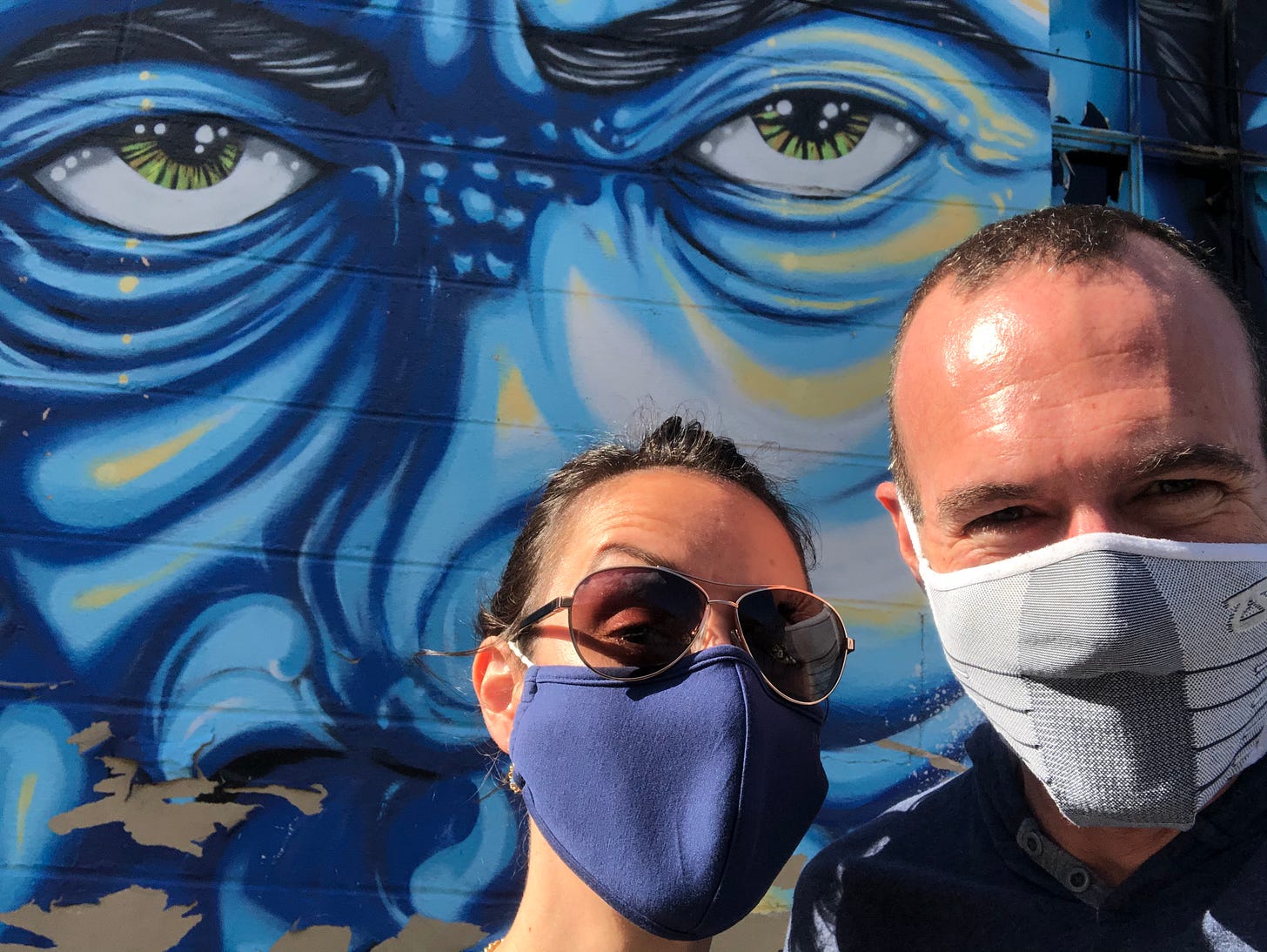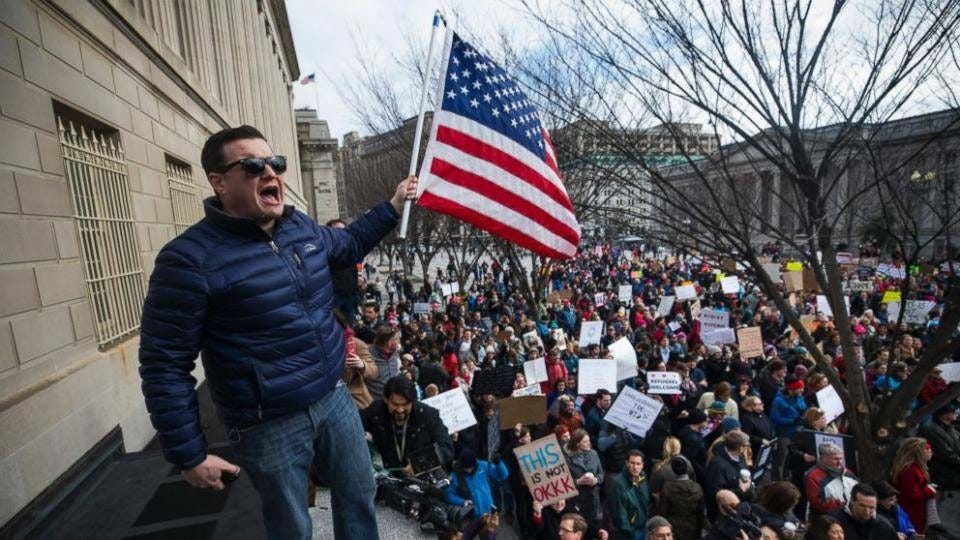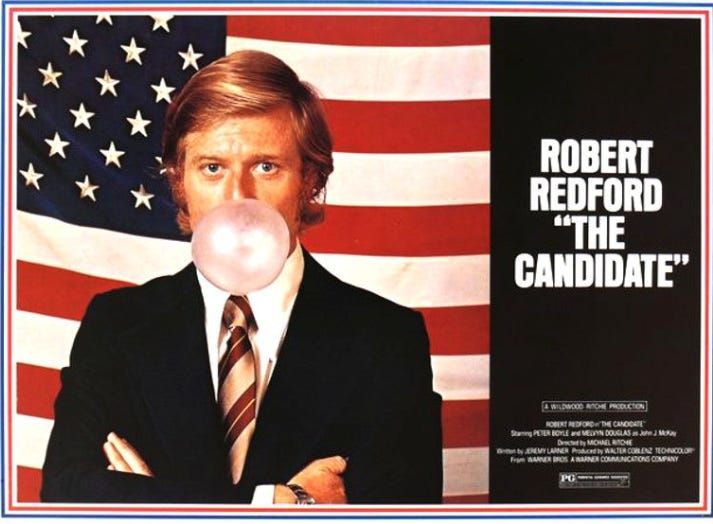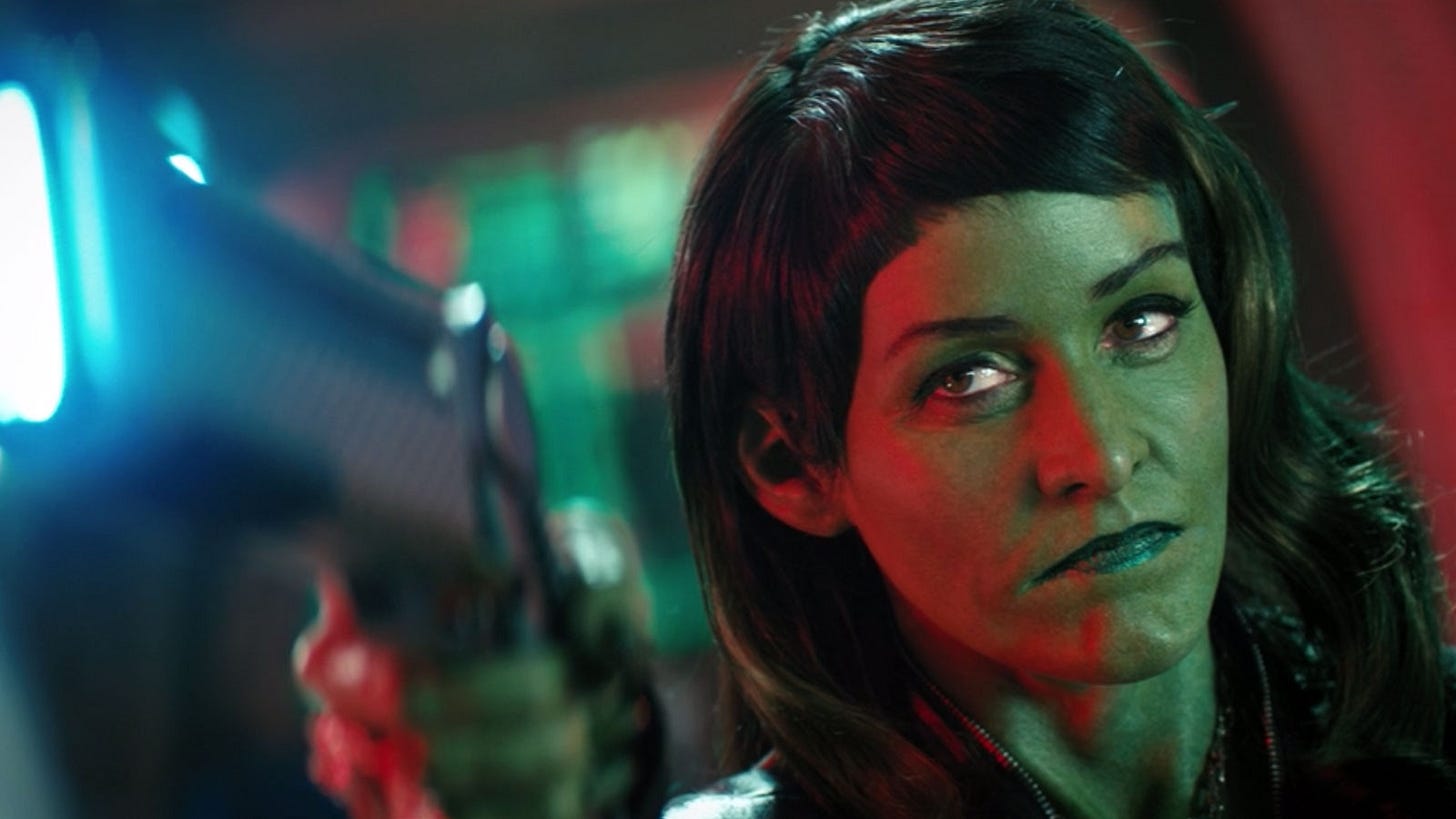Search History
They wouldn't call it "paying attention" if it wasn't worth something
Welcome to The Experiment, where we know the good guys will win because democracy is a home game for us.
Next week we’re going to talk about Dryuary, so if you’ve got stories about drinking, sobriety, or trying to reorder your life after the last four years, speak up. This week we’ve got Matt Zeller calling us to arms in “Trumpism, an American Cancer.” Jack Hughes returns with “The Ballot of Bill McKay,” which posits the Biden presidency might be the sequel to The Candidate we’ve been waiting for. An in her recap of Star Trek: Discovery’s S3 E12, “No Cookie for You,” Sonia Van Meter’s in a street-fighting mood.
And as always, we remember who we’ve lost and offer tips on what to do (learning about UFOs), read (Michael Hall’s excellent Texas Monthly piece, “‘It’s the Most Outrageous Thing I’ve Ever Seen. It Makes No Sense,’” watch (Small Axe on Amazon Prime), and listen to (Aries’ “Fool’s Gold”).
But first, whaddya lookin' at?
If Google searches are any indication, last year you were focused on proximate threats mixed in with a bit of democracy and self-care.
1) Covid testing near me
2) Early voting near me
3) Fires near me
4) Voting near me
5) Protests near me
6) Toilet paper near me
7) Nail salons open near me
8) Ballot drop box near me
9) Black owned restaurants near me
10) Drive in movie theater near me
Let’s just leave the people wanting to get their nails done alone for now. Last year was awful, what with all the deadly pandemic, raging forest fires, nationwide civil rights protests, voter suppression, and panic-driven shortage of toilet paper. Last year was gaspingly exhausting, endurable only because of the promise that if we elected Joe Biden — friendly old Uncle Joey B — that things would calm down, maybe even get back to normal. We could stand down, go off war footing, and maybe even rest easy.
Then there was that Saturday morning that occasioned joy throughout the country. After four-plus years of debasing ourselves upon the alter of a false god, all over this favored land the sun was shining bright. Bands were playing everywhere, and everywhere hearts were light. Everywhere men were laughing, and everywhere you could hear children shout. Because finally, after Joe Biden was declared President-elect, they had finally gotten the horse, that was loose in a hospital, out.
Let me catch you up if you’re not familiar with the horse in the hospital. John Mulaney, bless his rehabbing soul, articulated the funhouse reflection of watching the news in the Trump era with this simple image: “It’s like there’s a horse loose in a hospital.” If you haven’t seen this bit, watch it now. We’ll wait. It’s OK. Really, really. The students who came prepared don’t mind waiting. G’head.
No sooner did Rudy Giuliani decry the election’s declaration from the parking lot of Four Seasons Landscaping (that really happened, right?) that a thousand memes were born, each depicting Mulaney’s horse walking away from the hospital. Joe Biden won, for real, and now we could all go back to not sucking on Twitter’s glass pipe for our latest news fix. We could finally — I swear we thought this was true, we really did, I’m sorry please don’t be mad — exhale.
But… did we? We’ve all seen this part of the horror movie. Our heroes were climbing out of the bloody pit of zombies, saying, “Wow, I’m glad that’s over!” But there was too much time on the clock. The movie wasn’t over for another 20 minutes. And what’s the First Rule of the Trump Presidency? Anyone? Let me see some hands. OK, Zeller?
“It’s not that things can always get worse but that they inevitably will?”
Correct. Gold star.
For years anyone who has criticized Donald Trump has been accused of coming down with Trump Derangement Syndrome. I get it. The diagnosis is a defensive mechanism that allows the diagnostician to deny his own exposure. We were told to take him seriously but not literally, because no one could possibly mean what he said. He was just a clown! How do you take a clown seriously? We were told to give his bad words time off for good behavior and never told how that might be possible.
Political civilians treated us as if our reactions to Trump were the problem and not the President of the United States who called journalists enemies of the people and nearly tweeted us into a war with North Korea. Journalists, wary of taking sides in a fight they were already losing, vacillated between both-sidesing our asymmetrical cold civil war and visiting coffee shops in Pennsyltucky to understand the economic anxiety of racists.
Democrats cried wolf because, well, there was a wolf.
Republicans, meanwhile, learned what it’s like to have an abusive stepfather and endeavored evermore to stay on his good side. And like children of abusive parents, they got very good at reclassifying cruelty as comedy, absurdity as strength, and cruelty as leadership.
Democrats cried wolf because, well, there was a wolf right there, up on stage, stalking Hillary. He might as well have hand a handler, walking behind him holding a sign that said “wolf” with an arrow pointing down. But we were Democrats, so the only people seeing the situation clearly were the ones who appeared to have the most obvious bias.
As time went on, more people were forced to admit that Trump would never pivot to being an actual president. There was just going to be a horse in the hospital. The trick was to get him out of the hospital, and this imperative animated the Democratic Primary. The question wasn’t who was best liked or who had the most popular ideas. All most Democrats wanted to know was who could get the horse out of the hospital, which is how we ended up with Biden and that glorious Saturday.
The flaw in Mulaney’s “horse loose in a hospital” bit is that it assumes everyone saw the horse and, if they did see it, could agree that it was a horse and not undercover Antifa agitators in a horse costume. Some people aren’t in on the joke, and they’re the reason our respite from non-stop attention to equine shenanigans came to a sudden “I wonder what this red lever marked ‘emergency break’ does” stop on January 6. Suddenly, the horse was back in the hospital, except this time is was a bunch of horses asses walking around the capitol, stealin’ stuff.
This was horrifying stuff that induced in me a teeth-grindingly murderous rage that oddly coexisted with relief. For so long, we here at The Experiment have been crying wolf only to be told that we were taking the President too literally. When the wolves finally showed up on Tuesday, my fears took shape outside my imagination. As humiliating as it was to see a subReddit come to life and ransack our capitol, at least it was happening. The wolves were real.
If you’re not deranged, you haven’t been paying attention.
Now I can really relax and turn away. Even the FBI ought to be able to arrest people dumb enough to livestream their felonious field trip. There will be endless skirmishes from now on with people for whom LARPing a revolution requires outfits that the costumer for Cats would think, “Really, don’t you think that’s a bit… much?” And Ted Cruz and John Hawley will compete to see who can get oilier that though by wrapping themselves around the GOP’s axel, but now no one can get away indulging Trump like an unruly toddler. If you’re not deranged, you haven’t been paying attention.
They call it “paying attention” because it costs something, and after five years of Trump my pockets are empty. Our brains are not built to remain on war footing. Even soldiers at war got R&R, but there was no rest from this wickedness. This cold civil war spooled out in our hands as we doomscrolled toward the apocalypse. That we narrowly averted that end — fingers crossed — did not make the Bataan Death March of the Trump presidency any less exhausting.
Since President Goodbrain Bestwords descended the golden escalator in 2015, our amygdalae have been red-lining. People who have been at war experience the effects of long-term chronic stress. That’s what’s happening with us. We’re coming out the other end of a cold civil war. Are you feeling anxious? Depressed? Got tummy problems? Headaches? Trouble sleeping? Gaining weight? Trouble concentrating or remembering things? The Mayo Clinic says these are all symptoms of what happens when “that fight-or-flight reaction stays turned on.”
Our brains are not built to be on constant war footing. Turning away from the car crash, from the shenanigans, from the evil is not to deny it exists or to cop out. It’s survival. Because if we don’t survive then we don’t win.
The value system of the political left does not prioritize taking care of yourself. You know the parenting axiom that you have to put on your mask first before taking care of your child? If you’ve done time in Democratic politics, that’s reversed. You can’t countenance putting on your mask until everyone on the plane has theirs on first. To be fair, it’s hard to get a good night’s sleep if you’re thinking about children in cages crying for their mothers. But too many of us in the middle of a campaign think of basic human needs as something to be tended to after Election Day.
Turning away at long last from the Trumparamalamadingdong that has become our civic life rises above mere self care. Just as trees talk to each other and birds communicate, we signal to each other wordlessly by our reactions to our environment. There’s evidence, for example, that chilling TF out has real-world benefits on childhood development.
...Studies have shown that parental stress weakens children’s brains, depletes their immune systems, and increases their risk of obesity, mental illness, diabetes, allergies, even tooth decay.
More immediately, learning to handle stressful times more optimistically reduces the stress felt by those closest to you.
Even in the toughest times, when a person can think positively about the future they are capable of reducing the stress felt by their family members by as much as 60 percent.
Turning away from the soul-sucking succubus that is the Orange Leviathan is, therefore, an unselfish act. And saving your attention for something that feeds you, rather than feeds on you, does not deny the existence of evil. In her most recent newsletter for NPR’s Pop Culture Happy Hour, Linda Holmes argued that focusing on the good in the world, even if we’re talking The Bachelor (but really let’s not), encompasses a more complete vision of reality.
“The reason to allow yourself the space for entertainment and art is not that all is mostly right with the world except when you suddenly decide it isn't, but that a well-developed sense of reality will tell you that human beings have always sought out both beauty and distraction, no matter what was going on around them,” she wrote. “It's not about postponing your joy until some unspecified time when you can go back to thinking about it. It's about placing your joy in the context of the world and your obligations to it and keeping all of those things in mind together, right? This has always been the world. It has always contained all these things.”
What you pay attention to literally changes your world.
True, it has always contained these things, but do you want to know the magic of this? You take the good, you take the bad, you take them both and there you have the facts of life, but what good does any of this do if you blind yourself to it? If you spend all your attention on Trump and never go outside, look at the blue sky, and shout, “Next time listen to me when I tell you not to vote for the fascist!” does the good really exist? If a tree falls in the forest and you weren’t paying attention, does it matter to you if it ever existed in the first place?
It should not surprise you that paying attention is worth something, because paying attention is an exchange. In return you get your reality. What you pay attention to literally changes your world at least as far as you’re concerned, wrote Winifred Gallagher in Rapt:
That your experience largely depends on the material objects and mental subjects that you choose to pay attention to or ignore is not an imaginative notion, but a physiological fact. When you focus on a stop sign or a sonnet, a waft of perfume or a stock-market tip, your brain registers that “target,” which enables it to affect your behavior. In contrast, the things that you don’t attend to in a sense don’t exist, at least for you.
All day long, you are selectively paying attention to something, and much more often than you may suspect, you can take charge of this process to good effect. Indeed, your ability to focus on this and suppress that is the key to controlling your experience and, ultimately, your well-being.
You create a better world for you and those around you when you pay attention to better things. Joy is your obligation as a citizen just as much as punching ballots and Nazis. If we do not turn our attention from American Carnage to what we actually like about life, then the bad guys win and our better angels wither away from inattention. Put another way, what good is beating the bad guys if we lose what we were fighting to save in the first place?
And that brings us back to Google and what we were searching for in 2020, other than toilet paper and nail salons. This is the best news I can imagine, and it makes me so proud of all of you that I can barely type these words without crying. Last year, people googled “How to change the world” twice as often as “How to go back to normal.”
The only reason to go through Hell is to get to “Hell, yes.” We’ve got a whole world out there to bring into being. Let’s get to it, people.
Trumpism, an American Cancer
by Matt Zeller
Last July, Matt Zeller warned us that Trumpism could lead to a violent uprising. Now that he’s been proved right, what does he predict will happen next? That, he writes, depends on what we do now.
The Ballot of Bill McKay
by Jack Hughes
I like to think I’ve gotten good at anticipating the pop culture parallels Jack Hughes would draw with American politics, but I didn’t see this one coming. The Biden presidency is the sequel to The Candidate that we’ve been promised for decades. So what do we do now?
S3 E12: No Cookie for You!
by Sonia Van Meter
Sonia Van Meter writes the recap for S3 E12 like she drives, fearlessly and with aggressive malevolence. This one leaves a mark.
Who we’ve lost
How we’re getting through this
Getting solar power from space
Making Oeufs au Plat Bressanne
Getting ready to learn about UFOs
Making bomb-ass sweet potato and tomato red lentil dal
Accepting — or, like most Republicans, not — accepting Biden’s win
What we’re reading
Tim Alberta: “Jan. 6 Was 9 Weeks — And 4 Years — in the Making” - Few journalists got the 2020 cycle as right as Tim Alberta.
On Tuesday afternoon, just 24 hours before the siege of the Capitol, a very smart and accomplished Republican caught me off guard. While talking by phone about another subject, he took a sudden detour. He told me there were whispers that I’d become infected with “Trump Derangement Syndrome.” He wanted to know, given my impassioned accounting of the president’s lies and recklessness since Election Day, if I could still cover the GOP objectively.
I thought about that question Wednesday while watching the president incite a furious mob of supporters to march on our great fortress of American democracy. I thought about that question while watching Trump dispose with Pence, his most loyal advocate, like a used rag, for the betrayal of adhering to the Constitution. I thought about that question while watching domestic terrorists violently infiltrate the Capitol building and force the nation’s leaders to flee to a bunker, fearing for their lives.
Jacob Anbinder: “The Pandemic Disproved Urban Progressives’ Theory About Gentrification” - The people opposing growth are the ones causing gentrification.
The homeowner-friendly slow-growth activism that marked American cities in the late twentieth century is thus best understood not as the predecessor of today’s anti-gentrification politics but as the progenitor of the gentrification crisis itself. In wealthy coastal cities today, one need not develop skyscrapers or shopping malls to be a speculator in urban property. With widespread housing scarcity, simply owning a modest home in Berkeley or Brooklyn will suffice. In the 21st century, the division between the haves and the have-nots is no longer a matter of which side of the bulldozer one finds oneself on. Instead, it is a question of whether one belongs to the class that pays higher and higher rents with each passing year—or to the class that extracts them.
Robert Draper: “'Not even a single security guard was posted in the rotunda’” - My friend Draper was in the capitol when it all went down.
What I had heard, coming over the walkie-talkie of a nearby Capitol policeman, was that a “bomb-like device” had been discovered a few blocks away, next to the Republican National Committee headquarters. Hearing the news, three policemen rushed out. I left just after they did. I knew then that nothing would go as planned.
Michael Hall: “‘It’s the Most Outrageous Thing I’ve Ever Seen. It Makes No Sense.’” - The ability of smart people to torture logic infuriates me.
“The trial judge, DA, and police chief—each of them says he’s innocent. All of a sudden, the judges are ignoring DNA, questioning its validity as a science, and they want the trial court to get the witnesses to recant. It’s the most outrageous thing I’ve ever seen. It makes no sense.”
Paul Kane: “Inside the assault on the Capitol: Evacuating the Senate” - My friend Paul Kane was there, too, and he captures a detail about how January 6 could have been much, much worse:
In a sign of quick staff thinking, aides to the Senate parliamentarian rounded up several people to grab the boxes containing the electoral college certificates submitted by the states — documents needed to certify Biden’s victory.
Jacob Sutherland: “A bad op-ed is more than just a bad take” - PREACH
[P]ublishers have the responsibility to ensure that editorial teams, specifically those responsible for overseeing the publication of op-eds, are using the principles of fact-checking and transparency. This is not to say that opinions should not be published out of fear that they will be viewed unfavorably by the news team or the public. Opinions that cannot be backed up with tangible facts, data, or verified information, which cause harm to marginalized communities, which incite violence, or all of the above, contribute more to the spread of misinformation and polarization than they contribute to the marketplace of ideas.
Jonathan Tilove: “These Texas Congressmen Fought off the Mob. Then They Voted With Trump.” - Texas, Texas, yee haw.
“Today, the people’s House was attacked, which is an attack on the Republic itself. There is no excuse for it. A woman died. And people need to go to jail,” said Roy, a former chief of staff for Senator Ted Cruz, who led the failed effort to block approval of the Biden electors. “And the president should never have spun up certain Americans to believe something that simply cannot be.”
Anna Wiener: “Is Substack the Media Future We Want?” - I mean, I don’t know. Maybe.
Readers of magazines, newspapers, and many Web sites, which publish established writers alongside emerging ones, automatically encounter new voices; on Substack, the most successful newsletters are almost always written by people who have already cultivated an audience at traditional publications or built up a following elsewhere.
What I’m watching
Saw Bridgerton on Netflix; it’s a YA soap with naked butts. If that’s your sorta thing, good on ‘ya, as they say. It was not mine.
Saw Love Live on HBO Max. We stan for Anna Kendrick at The Experiment, and the characters and conflicts felt real, and if I were the right age for a Gen Z SITC reboot I might have liked this show more, but I’m not, and I didn’t.
Small Axe, Steve McQueen’s Amazon Prime anthology, on the other hand, deserves your attention, and in return for same it offers deep enjoyment. Listen to this conversation first to understand a little more of what you’re seeing, and then sink into the world of being Black in Britain. In particular, the second installment, Lovers Rock, depicts Black joy. For a White viewer, Lovers Rock has the feel of what happens when we’re not around. This is Black filmmaking about Black subjects for Black audiences. It’s a privilege to witness joy of any kind, especially the sort (a house party with strangers) that we can’t have now.
What I’m listening to
Back in 2019, I wrote about chaperoning a hip-hop concert downtown that opened my eyes to the new DIY possibilities in the music industry. And not for nothing, the artists, Aries, makes great genre-non conforming music. I particularly admire how he connects with his audience.
He’s back with new stuff. His low-key sing-along vibe sucks me right in, especially in “Conversations.” But check out “Fool’s Gold.” He uses the structural tactics of a song that comes much harder, but he hangs back, surfing along where another artist would be pounding his chest. Aries has a remarkable vibe.
What do you think of today's email? I'd love to hear your thoughts, questions and feedback. I might even put ‘em in the newsletter if I don’t steal it outright.
Enjoying this newsletter? Forward to a friend! They can sign up here. Unless of course you were forwarded this email, in which case you should…
If your new year’s resolution was to lose weight, try Noom, and you’ll quickly learn how to change your behavior and relationship with food. This app has changed my life. Click on the blue box to get 20% off. Seriously, this works.
Headspace is a meditation app. I’ve used it for a couple years and am absolutely shocked at how much it’s taught me about managing my inner life. Try it free for a couple weeks. Don’t worry if you’ve never done it before. They talk you through it.
I now offer personal career coaching sessions through Need Hop.
We set up a merch table in the back where you can get T-shirts, coffee mugs, and even tote bags now. Show the world that you’re part of The Experiment.
We’ve also got a tip jar, and I promise to waste every cent you give me on having fun, because writing this newsletter for you is some of the most fun I’ve had.
Forget the Alamo: The Rise and Fall of the American Myth by Bryan Burrough, Chris Tomlinson, and myself comes out June 8 from Penguin Random House. There is no better way to support this book than to pre-order a copy. You’re going to love reading what really happened at the Alamo, why the heroic myth was created, and the real story behind the headlines about how we’re all still fighting about it today.






